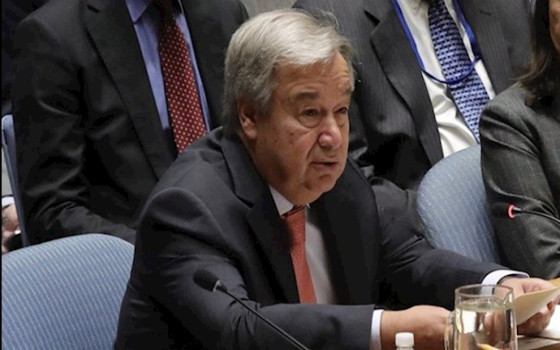
On the International Day in Support of Victims of Torture..United Nations: It is a crime against humanity under international law

- Europe and Arabs
- Monday , 26 June 2023 18:39 PM GMT
Brussels: Europe and the Arabs
Torture aims to annihilate the victim's personality and deny the inherent dignity of the human being. The United Nations has condemned torture from the outset as one of the most degrading acts committed by human beings against their fellow human beings. According to the publication of the United Nations website
Torture is a crime under international law. It is strictly prohibited under all relevant instruments and cannot be justified under any circumstances. It is a prohibition that forms part of customary international law, which means that it is binding on every member of the international community, regardless of whether or not the state has ratified international treaties expressly prohibiting torture. The systematic and widespread practice of torture constitutes a crime against humanity.
In its resolution 52/149 of 12 December 1997, the General Assembly proclaimed 26 June as the United Nations International Day in Support of Victims of Torture, with the aim of the total elimination of torture and the effective functioning of the Convention against Torture and Other Cruel, Inhuman or Inhuman Treatment or Punishment or insulting (resolution 46/39, annex), which entered into force on 26 June 1987.
26 June is an opportunity to call on all stakeholders, including United Nations Member States, civil society and individuals everywhere, to unite in support of the hundreds of thousands of people around the world who have been victims of torture, as well as those who are still being tortured. today.
recovery and rehabilitation
Recovery from torture requires rapid and specialized programmes. The work of rehabilitation centers and organizations around the world has shown that victims can move from a state of terror to recovery. The United Nations Voluntary Fund for Victims of Torture, administered by the United Nations Human Rights Office in Geneva, is a unique victim-focused mechanism that directs funding to assist victims of torture and their families. The Fund was established in 1981 with a mission to support victims of torture and their families, and this year it celebrates its fortieth anniversary. The Fund works by directing voluntary donations to civil society organizations that provide legal, social, humanitarian, psychological and medical services. Beneficiaries include human rights defenders, people deprived of liberty, children and adolescents, refugees and migrants, victims of enforced disappearance, indigenous peoples, victims of sexual and gender-based violence, and LGBT people. The United Nations Voluntary Fund for Victims of Torture accepts donations.
Symbolism of 26 June
The United Nations International Day in Support of Victims of Torture, 26 June, marks the day the United Nations Convention against Torture and Other Cruel, Inhuman or Degrading Treatment—one of the main tools in the fight against torture—entered into force in 1987. Today there are 173 State party to this agreement.
In 1948, the international community condemned torture and other cruel, inhuman or degrading treatment in the Universal Declaration of Human Rights adopted by the United Nations General Assembly. In 1975, in response to the strong activism of non-governmental organizations, the General Assembly adopted the Declaration on the Protection of All Persons from Being Subjected to Torture and Other Cruel, Inhuman or Degrading Treatment or Punishment.
During the 1980s and 1990s, progress was made in the development of legal standards and instruments and in the enforcement of the prohibition of torture. The United Nations Voluntary Fund for Victims of Torture was established by the General Assembly in 1981 to fund organizations providing assistance to victims of torture and their families.
The Convention against Torture and Other Cruel, Inhuman or Degrading Treatment or Punishment was adopted by the General Assembly in 1984 and entered into force in 1987. Its implementation among states parties is carried out by a committee of independent experts, the Committee against Torture.
In 1985, the Commission on Human Rights appointed its first Special Rapporteur on Torture, an independent expert charged with reporting on the state of torture in the world. During the same period, the General Assembly adopted resolutions highlighting the role of health personnel in protecting prisoners and detainees from torture, and establishing general principles for the treatment of detained persons. In December 1997, the General Assembly proclaimed 26 June as the United Nations International Day in Support of Victims of Torture.
In 2002, the Optional Protocol to the Convention against Torture was adopted, which aims to prevent torture and cruel, inhuman or degrading treatment by establishing an international inspection regime for places of detention. The protocol also requires states to establish independent national preventive mechanisms to examine the treatment of persons in detention, to make recommendations to government authorities to strengthen protection against torture and to comment on existing or proposed legislation. The Subcommittee on Prevention of Torture administers the protocol, to which 91 states are now parties
Almost four decades after the adoption of the United Nations Convention against Torture, there is evidence that torture is still practiced in all regions of the world, although it is a recognized international crime.
The United Nations has repeatedly recognized the important role that non-governmental organizations play in combating torture. In addition to lobbying for the establishment of United Nations instruments and monitoring mechanisms, she made an invaluable contribution to their enforcement. Individual experts, including the Special Rapporteur on Violence against Women and Girls, the Special Rapporteur on Violence against Women, and treaty monitoring bodies, such as the Committee against Torture, rely heavily on information brought to them by NGOs and individuals.












No Comments Found